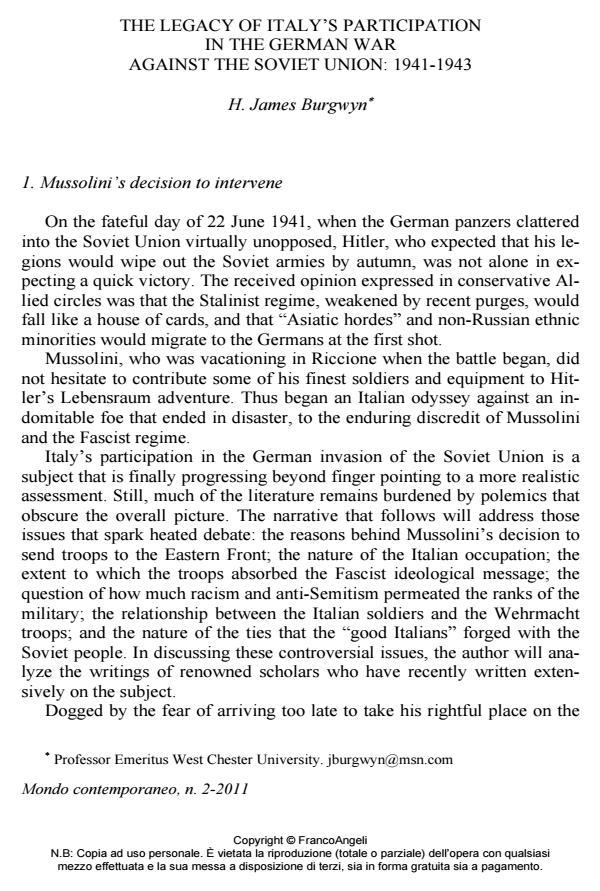The Legacy of Italy’s Participation in the German War Against the Soviet Union: 1941-1943
Journal title MONDO CONTEMPORANEO
Author/s H. James Burgwyn
Publishing Year 2011 Issue 2011/2
Language English Pages 21 P. 161-181 File size 308 KB
DOI 10.3280/MON2011-002006
DOI is like a bar code for intellectual property: to have more infomation
click here
Below, you can see the article first page
If you want to buy this article in PDF format, you can do it, following the instructions to buy download credits

FrancoAngeli is member of Publishers International Linking Association, Inc (PILA), a not-for-profit association which run the CrossRef service enabling links to and from online scholarly content.
The reasons behind Mussolini’s decision to join Hitler in the invasion of the Soviet Union and the subsequent behavior of the Italian troops have sparked lively controversy in the historical literature. In this historiographical essay, the author initially poses the question: was the Duce driven to intervene by sound, or warped, Realpolitik, or by ideological conviction? The author then turns to the nature of the Italian occupation and examines the extent to which Fascist ideology permeated the minds and influenced the conduct of the Italian soldiers fighting along side the Wehrmacht. Did they believe in the Fascist definition of anti-Communist crusade, or were they fighting more out of duty, honor, and country? Next, the author tackles the thorny question of racism and anti-Semitism in the Italian ranks. In his treatment of these questions, the author discusses the important writings of recent historians on the subject. The author then addresses the nature of the relationship between the Italian and German soldiers. Did they, as «good Italians» forge closer ties with Soviet citizens, thanks to a common outlook and experience, than the socalled killer Wehrmacht warriors? Again, the writings of eminent historians who have recently written on these questions are analyzed. In conclusion, the author evaluates Mussolini’s decision to send a large contingent of his military to fight on the Eastern Front.
Keywords: Mussolini’s decision to intervene, Fascism and the Italian troops, the so-called <i>italiani brava gente</i>, friendly Russian and brutal German, racism and anti- Semitism, the Axis alliance at war, Mussolini’s flawed decision-making
H. James Burgwyn, The Legacy of Italy’s Participation in the German War Against the Soviet Union: 1941-1943 in "MONDO CONTEMPORANEO" 2/2011, pp 161-181, DOI: 10.3280/MON2011-002006